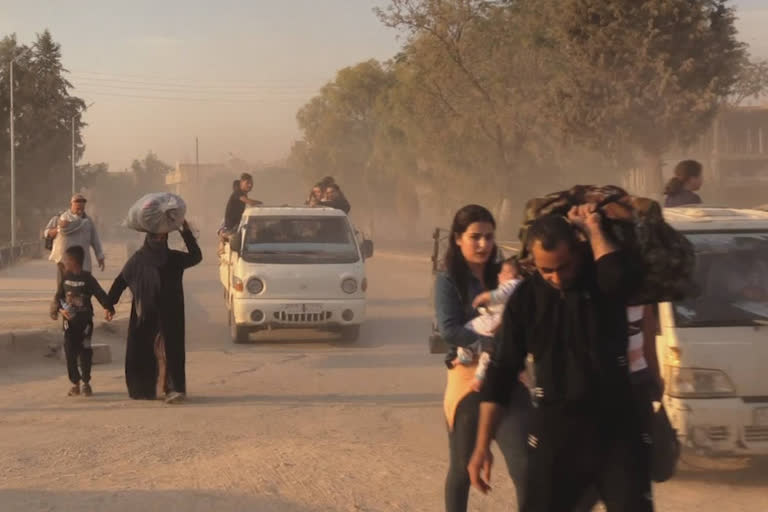Ras Al-Ain (Syria): Turkey's military offensive in northeastern Syria has displaced more than 60,000 people in less than a day, a war monitor said on Thursday.
"Since Wednesday, more than 60,000 people fled border areas," the Syrian Observatory for Human Rights said, adding that most of the displaced travelled east towards the city of Hasakeh.
Rami Abdel Rahman, the head of the Britain-based monitor, said the biggest displacement was from the border areas of Ras al-Ain, Tal Abyad and Derbasiyeh.
Turkey launched a broad assault on Kurdish-controlled areas in northeastern Syria, with intensive bombardment paving the way for a ground offensive made possible by the withdrawal of US troops.
President Recep Tayyip Erdogan on Wednesday announced the start of the attack on Twitter and soon after jets and artillery targeted Kurdish positions along the full width of the border, sending thousands of civilians fleeing their homes.
That was followed late in the evening by the beginning of a ground operation, the Turkish defence ministry said.
The spokesman for one of the pro-Turkish Syrian militant groups told media that the land phase of the operation began in Tal Abad, and Turkish media reported special forces and armoured vehicles had entered at several points along the border.
At least eight civilians and seven Kurdish fighters were killed on Wednesday, mostly in cross-border artillery fire, in various locations along the border, including in the city of Qamishli, a war monitor said.
The assault had seemed inevitable since US President Donald Trump on Sunday announced a military pullback from the border, but the attack triggered international condemnation.
India on Thursday said that it was 'deeply concerned' over the 'unilateral military offensive' by Turkey in northeastern Syria and asserted that the action can undermine stability in the region as well as the fight against terrorism.
The White House said on Wednesday that the Turkish assault was a 'bad idea' even after it had effectively gifted Erdogan a green light and smashed the US alliance with the Kurdish forces, who spearheaded five years of ground battles against the Islamic State group in Syria.
Kurdish sources reported that at least 16 positions were struck in the first hours of the operation, to which the Kurdish-led Syrian Democratic Forces (SDF) responded with some cross-border artillery fire.
The SDF called on the international community to impose a no-fly zone to protect against 'an imminent humanitarian crisis'.
Erdogan, who dubbed the attack 'Operation Peace Spring', said that the offensive is necessary to curb the power of the SDF due to its ties with Kurdish insurgents inside Turkey.
He also wants a 'safe zone' on the Syrian side of the border where Turkey could send back some of the 3.6 million refugees it hosts from the eight-year civil war.
In the face of the onslaught, Kurdish authorities announced a general mobilisation, urging all civilians to 'head to the border with Turkey to resist during this delicate historical moment'.
Kurdish leaders said that they would hold their erstwhile US ally and the whole international community responsible for any 'humanitarian catastrophe'.
In Ras al-Ain, Kurdish-led security forces set up checkpoints and stockpiled tyres to set alight to blur the vision of Turkish military pilots, media reported.
Ras al-Ain was one of the places from which US troops withdrew on Monday.
"We will not leave this land," said Kaws Seem, a 32-year-old Ras al-Ain resident.
"War has been chasing us for years, and everyday Erdogan threatens us with a new attack," he added.
It was expected that Ras al-Ain and Tal Abad would be the focus of the first assaults.
Kurdish forces have dug trenches and tunnels in both areas, covering streets with metal canopies to block the cameras of Turkish drones.
But the flat and open terrain favour the vastly superior Turkish military over the Kurds, who have no air force and limited equipment.
The Kurdish-led SDF said that they lost 11,000 personnel in years of operations against IS that climaxed in March with a battle against the final bastion of the jihadists' caliphate in Baghouz.
Trump, who is campaigning for a second mandate, has faced a barrage of criticism, including from close allies in Washington, for appearing to leave US allies to their fate.
Senior Republican senator Lindsey Graham argued the US administration had 'shamelessly abandoned' the Kurds and warned he would 'lead (an) effort in Congress to make Erdogan pay a heavy price'.
There has also been a chorus of international concern, including from France and Britain, the top US partners in the anti-IS coalition and Russia, now even more firmly the main foreign player in Syria.
Since 2015, Russia has been the main military backer of the Syrian government, which has seized on the policy shift from Trump to try to persuade the Kurds to accept the restoration of central government control.
Read also: Mamallapuram has cultural traces of both India and China



